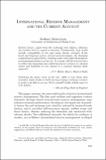Artículo
International reserve management and the current account
Date
2008Abstract
This paper assesses the costs and benefits of active international reserve management. The first part outlines and appraises various channels through which international reserve management may enhance economic performance, focusing on two important channels: it lowers the real exchange rate volatility induced by terms-of-trade shocks, and it provides self-insurance against sudden stops and fiscal shocks, thereby reducing the downside risk associated with adverse shocks. Two additional channels, for which the evidence is weaker, are as follows: international reserve management is alleged to lead to higher growth by fostering exports (that is, it operates through a mercantilist motive), and it has a greater capacity to smooth adjustment to shocks over time, thereby reducing the speed of adjustment of the current account.
Collections
View/


